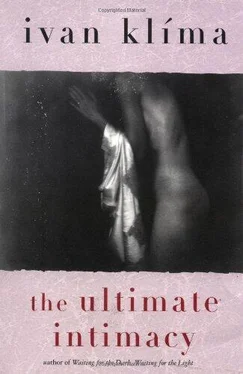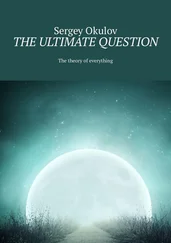Ivan Klima - The Ultimate Intimacy
Здесь есть возможность читать онлайн «Ivan Klima - The Ultimate Intimacy» весь текст электронной книги совершенно бесплатно (целиком полную версию без сокращений). В некоторых случаях можно слушать аудио, скачать через торрент в формате fb2 и присутствует краткое содержание. Год выпуска: 1998, Издательство: Grove Press, Жанр: Современная проза, на английском языке. Описание произведения, (предисловие) а так же отзывы посетителей доступны на портале библиотеки ЛибКат.
- Название:The Ultimate Intimacy
- Автор:
- Издательство:Grove Press
- Жанр:
- Год:1998
- ISBN:нет данных
- Рейтинг книги:3 / 5. Голосов: 1
-
Избранное:Добавить в избранное
- Отзывы:
-
Ваша оценка:
- 60
- 1
- 2
- 3
- 4
- 5
The Ultimate Intimacy: краткое содержание, описание и аннотация
Предлагаем к чтению аннотацию, описание, краткое содержание или предисловие (зависит от того, что написал сам автор книги «The Ultimate Intimacy»). Если вы не нашли необходимую информацию о книге — напишите в комментариях, мы постараемся отыскать её.
The Ultimate Intimacy — читать онлайн бесплатно полную книгу (весь текст) целиком
Ниже представлен текст книги, разбитый по страницам. Система сохранения места последней прочитанной страницы, позволяет с удобством читать онлайн бесплатно книгу «The Ultimate Intimacy», без необходимости каждый раз заново искать на чём Вы остановились. Поставьте закладку, и сможете в любой момент перейти на страницу, на которой закончили чтение.
Интервал:
Закладка:
I told him I'd hardly use the car, but that I needed it from time to time, for example, those Sundays when I have two services in close succession.
So don't have them in close succession, was his advice.
But I shouldn't just write about him critically. He goes with Alois to visit Fyodor. I asked him why he does it. He hasn't got anybody else, ' he explained. The operation was successful apparently and Fyodor is happy. He was afraid he would be a cripple.
'Tell me, please, what's the Russian for cripple?' I asked.
'Kripel, of course, ' he said, with his usual assuredness.
I went to check in the big Russian dictionary. The word doesn't exist in that language.
At the theological faculty, most of my fellow students came from families with a Protestant tradition. Often they would be children of clergy.
In our home, Dad put up with Mum's faith because he was tolerant, but he made it plain that God was simply a human invention: man created God and not the other way round.
A lot of what my fellow students took for granted I had to figure out for myself. I would often obstinately silence within me Dad's sceptical voice. Anyway, I was never able to summon up interest in a range of questions that for centuries had agitated the Fathers of the Church and — to my astonishment — a number of my contemporaries. What point was there in arguing over whether fallen angels could atone for their guilt, whether mortality was a consequence of original sin, or whether man was subject to a single or a double judgement: judgement of the body and of the soul?
What excited me most of all was the figure of Jesus and his revolutionary message. At one time — I was barely twenty — I was determined to write a book about Jesus and started to seek out literature and study it. I was astounded at the amount of material written on the subject. The handful of facts recorded by the evangelists had given rise to thousands of parallel and quite contradictory interpretations. According to some, Jesus was God; according to others he had a dual nature and was therefore God-man. Some regarded him as a man, but endowed with a prophetic spirit; according to others, he was a messiah, or a leader of an ascetic religious sect, or alternatively a Jewish rebel. And of course I also read elsewhere that he did not live at all, or that the gospels had merged two diffèrent figures into one.
I perceived that I would not be capable of writing a real portrait of Jesus — nobody had yet and nobody ever would— and that the books I was reading told me more about their authors than about the subject matter. Only later did I realize that this was the fate of all books and films that try to deal with a real person. The essence of another person is unfathomable, and even more so when it is the Son of God, about whom information is not only fragmentary but also affected by prejudice, superstition or outdated belief.
For me in my younger years, belief was chiefly an alternative to the depressing lifestyle which then prevailed, an alternative to the miserable planned 'happiness' that depended solely on the number of things one could or was allowed to own. In the Bible I found passages that resonated with my own feelings and that filled me with satisfaction and helped me dispel my doubts and scepticism about its message.
When I informed Dad that I wanted to study at the theological faculty, he was stupefied. Then he asked me if I had given it proper thought. 'Yes, ' I replied.
If that's your decision, ' is all he could say. But he went on to add that
it was necessary to weigh up one's decisions very carefully, but once one had taken them it was necessary to follow them through to their conclusion.
I told him that it went without saying.
I went to a lecture by a German psychologist on 'Esoterica and Reincarnation. In it he maintained that, according to the law of rhythm, which is the fundamental law of the universe, death alternates with life in the same way that waking and sleeping do — being alive and being dead are just two poles of the unbroken stream of life. So death was not unbeing but the opposite pole from being. When you die, you cross the boundary between two worlds, this one and the next. For the person who enters the next world, the next world becomes this world and our world becomes the next world for him until such a time as he again returns to it. Birth, the arrival in our world and hence the departure from that other, astral world, is regarded there as death. The speaker deduced that the soul brought with it from past lives a hidden memory and a knowledge which in this world takes the form of talent or curiosity. The lecturer talked of experiments in which patients had apparently been induced to recall not only what they had felt in their mother's womb, but also the life of their soul in the other world before their latest reincarnation. He even went so far as to speculate on the probable length of time between successive incarnations (apparently the period is getting shorter all the time and now lasts scarcely ten years) and whether a change of sex is possible in the process.
While I try to keep an open mind as regards the fate of the human soul during this life and after it, and am fully aware that Scripture expects not only the return of Jesus Christ but even of the Prophet Elijah, and that we all believe in the resurrection of the body, which assumes the continued existence of the soul beyond our world, I couldn't rid myself of the unpleasant feeling that I was listening to a charlatan.
I pray badly. I'm not talking about the prayers that I say aloud during services, but about the silent prayers in which I speak to God on my own behalf. I am incapable of being intimate even with Him. I remain silent
about the most important things: my anxieties, my suppressed longings, my backsliding.
I do likewise in these notes. I am afraid that one day if someone reads them (although it's most unlikely; Dad left heaps of official bumf and notes — I brought home two full boxes when Mum died. I haven't opened them yet and I don t know if I ever will) they'll say to themselves: didn't anything bother him, did nothing drive him to despair, were there no moments when he was scared of nothingness and his vain attempts to elude it?
I mentioned to Martin my inability to be intimate enough in my prayers. 'That's something I'm aware of he said all too well aware of, in fact. But prayer is itself a deeper level of intimacy. '
'What level?' I asked.
'At least the second, ' he said and laughed.
'And which is the first?'
He reflected. 'When you tell your wife your dreams, say. Even the very intimate ones. '
I don't tell Hana my dreams. At best I write them in this notebook. I am at the first level of intimacy with my diary.
A dream about my mother. She was already old and infirm. She was lying in bed and I was sitting by her. Suddenly she said, I have to tell you something, Dan.
Go ahead, Mummy.
I've not told anyone about this, she said. Then she asked if I remembered how they had once built a new road not far from our cottage. I said I did. (We never lived in a cottage and no such road was ever built.) And did I still remember that young architect who lodged with us in that cottage? I didn't. It was when they sent Dad to prison, she insisted. I told her I now remembered.
He didn't want to live in a trailer, Mum explained and the money came in handy, as it was already Dad's second year in prison. I took him in even though I knew that people would start rumours. He wasn't particularly young, but he was a fine man. He had eyes like the gamekeeper who seduced Viktoria. And so I had an affair with him, Dan. You know Dad got ten years, don't you? It never occurred to me he'd be released earlier. I used to write to him and send parcels, and
Читать дальшеИнтервал:
Закладка:
Похожие книги на «The Ultimate Intimacy»
Представляем Вашему вниманию похожие книги на «The Ultimate Intimacy» списком для выбора. Мы отобрали схожую по названию и смыслу литературу в надежде предоставить читателям больше вариантов отыскать новые, интересные, ещё непрочитанные произведения.
Обсуждение, отзывы о книге «The Ultimate Intimacy» и просто собственные мнения читателей. Оставьте ваши комментарии, напишите, что Вы думаете о произведении, его смысле или главных героях. Укажите что конкретно понравилось, а что нет, и почему Вы так считаете.






![Theresa Cheung - The Dream Dictionary from A to Z [Revised edition] - The Ultimate A–Z to Interpret the Secrets of Your Dreams](/books/692092/theresa-cheung-the-dream-dictionary-from-a-to-z-r-thumb.webp)





